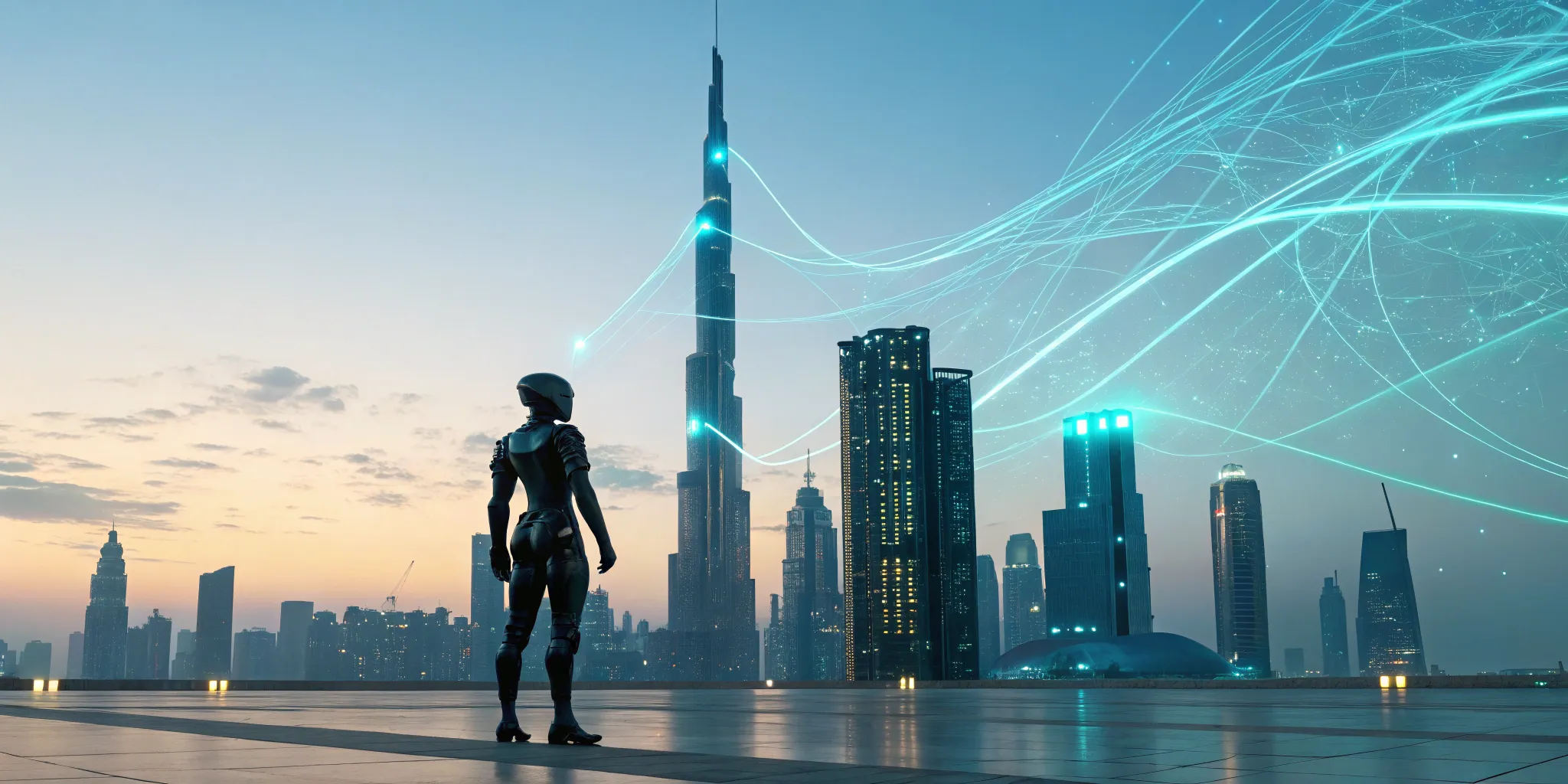Not all recruiters are created equal, especially in a field as complex as Artificial Intelligence. A generalist might see "Python" on a resume and think it's a match, but they often miss the critical nuances that separate a good AI engineer from a great one. True success in hiring requires a partner who speaks your language—one who understands the difference between TensorFlow and PyTorch and knows what a strong project portfolio looks like. The most effective AI Engineer recruiters NYC are specialists who live and breathe this world. They have cultivated networks of top-tier talent and can identify the right fit beyond just keywords, ensuring you build a team that can truly innovate.
Key Takeaways
- Understand the Competitive Landscape: To succeed in NYC's high-stakes AI market, companies must offer competitive salaries and a compelling vision, while candidates need to showcase practical skills through a strong portfolio.
- Partner with a Specialist to Access Hidden Talent: General job boards only show a fraction of the talent pool. A specialized AI recruiter provides a direct line to a vetted network of passive candidates and offers the market knowledge needed to make a competitive offer.
- Prioritize a Holistic Candidate View for a Lasting Fit: A successful hire depends on more than just technical skills. Evaluating a candidate's real-world projects, communication style, and problem-solving abilities is crucial for finding someone who will thrive within your team culture.
Why NYC is a Hotspot for AI Talent
New York City has firmly planted its flag as a global leader in technology, and its AI scene is no exception. The city's unique blend of established industries and a fast-growing tech sector creates a powerful magnet for top-tier AI talent and the companies eager to hire them. If you're an AI professional or an employer in the field, understanding what makes NYC tick is the first step toward making your next big move.
A Look at the Thriving Tech Scene
It’s no secret that New York City is a major hub for AI innovation. The five boroughs are buzzing with a diverse mix of tech giants, ambitious startups, and established companies all integrating artificial intelligence into their operations. This creates a high-energy ecosystem where collaboration and creativity flourish, and where skilled AI professionals are in constant demand. The sheer density of opportunity means you’re not just finding a job; you’re joining a community at the forefront of technological advancement. This vibrant environment makes it an ideal place for AI engineering talent to build a meaningful career.
Breaking Down AI Salaries and Benefits
Let’s talk numbers, because they tell a compelling story. The financial incentives for AI engineers in NYC are significant, reflecting the intense demand for specialized skills. While the average salary for an AI Engineer in the US is impressive, New York City takes it a step further, with local averages reaching around $217,000. According to data from Built In, many AI engineers in the city earn between $160,000 and $170,000, with top earners commanding even higher figures. This competitive compensation shows just how much companies in the city value top AI talent, making it one of the most lucrative markets for professionals in the field.
Where AI Innovation and Opportunity Meet
In New York City, innovation isn't just a buzzword—it's the foundation of the job market. The city is home to a strong network of specialized recruitment firms dedicated to connecting leading companies with the right data professionals. Top recruiters focus specifically on filling roles in AI and Data Science, acting as a bridge between groundbreaking companies and the talent that fuels them. This specialized support system makes it easier for both employers and candidates to find the perfect match. For professionals, it means direct access to some of the most exciting AI jobs available, from machine learning to data infrastructure and beyond.
What Sets the Best AI Recruiters Apart
In a field as specialized and fast-moving as Artificial Intelligence, not all recruiters are created equal. The right recruitment partner does more than just forward resumes; they act as a strategic advisor, a market expert, and a vital connector. For companies, they are an extension of your team, helping you build the groups that will define your future. For candidates, they are career advocates who can open doors to opportunities you won't find on public job boards. They understand the nuances of the AI landscape and can identify talent that truly aligns with your company's vision and culture.
Finding this kind of partner can be the difference between a good hire and a great one. The best AI recruiters don’t just fill roles—they build relationships and understand the long-term goals of both the businesses they work with and the professionals they represent. They provide insights into market trends, salary benchmarks, and what it takes to attract and retain top-tier talent in a competitive city like New York. So, what exactly separates the great AI recruiters from the rest? It comes down to a few key qualities: deep industry knowledge, an exclusive network, a proven track record, and a genuine commitment to the people they work with.
Deep Expertise in the AI Industry
First and foremost, top-tier AI recruiters have a genuine understanding of the industry. They know the difference between a Machine Learning Engineer and a Data Scientist and can discuss specific programming languages, frameworks, and models with confidence. This deep expertise means they can accurately assess a candidate's technical skills and experience, ensuring they are a true match for the role's demands. They don't just match keywords on a resume; they understand the context behind the technology and how it applies to business goals. This level of knowledge is critical for companies building out their AI engineering teams and for professionals who want to work with a recruiter who truly gets what they do.
Access to an Exclusive Talent Network
The best recruiters don't just find candidates; they cultivate relationships. They have a strong, established network of AI professionals, including many passive candidates who aren't actively applying for jobs but are open to the right opportunity. This gives companies access to a hidden talent pool that they couldn't reach through traditional job postings. These passive candidates are often the most sought-after professionals in the field—they are happily employed but have the exact skills you need. For job seekers, partnering with a well-connected recruiter means gaining access to exclusive job opportunities at innovative companies. A great recruiter leverages their network to find not just a qualified candidate, but someone who will also be a fantastic fit for the team's culture.
A History of Successful Placements
Experience speaks volumes. A recruitment agency with a long history of successful placements has a proven process for connecting the right talent with the right company. Their track record is a testament to their ability to understand client needs, identify exceptional candidates, and manage the hiring process smoothly from start to finish. When you're evaluating a recruiter, look for evidence of their past successes, as this history shows they have the industry knowledge and resilience to deliver consistent results. It demonstrates that they offer effective hiring solutions that go beyond simply filling a seat and focus on creating lasting, impactful partnerships for both sides.
Putting the Candidate Experience First
How a recruiter treats candidates says a lot about their professionalism. The top agencies prioritize the candidate experience, ensuring clear, consistent, and respectful communication throughout the entire process. They provide timely updates, offer constructive feedback, and act as a trusted guide for job seekers. For companies, this is incredibly important because a recruiter is an extension of your brand. A positive experience, even for candidates who don't get the job, strengthens your employer reputation in a tight-knit industry. A recruiter who focuses on building strong relationships ensures that top talent feels valued and engaged, making them more likely to accept an offer and speak highly of your company to their peers.
Meet NYC's Top AI Recruitment Agencies
Finding the right recruitment partner in a city as dynamic as New York can feel like a big task. The best agencies don’t just fill roles; they understand the nuances of the AI landscape and connect you with talent that truly fits your team’s vision. Let’s look at a few of the key players in the city and what makes them stand out.
How People in AI Delivers Results
What sets us apart at People in AI is our dedicated focus. We live and breathe Artificial Intelligence and Machine Learning. Instead of spreading ourselves thin across the entire tech industry, we concentrate on connecting businesses with top-tier talent in highly specialized roles. Our areas of expertise cover the full spectrum of AI development, from AI and Machine Learning Engineers to Data Scientists and MLOps Engineers. This sharp focus means we have a deep understanding of the skills these roles require and maintain a network of professionals who are leaders in their fields. We’re not just recruiters; we’re industry specialists committed to building world-class AI teams.
A Glimpse at Other Key Players
Of course, the NYC recruitment scene has other strong contenders. For instance, Stabile Search is a well-known firm that specializes in Quantitative Finance, AI, and Data Science, serving a specific intersection of tech and finance. They have a strong reputation for placing talent in these niche areas. Another notable agency is Blue Signal, which helps companies find AI engineers, data scientists, and machine learning experts. They work across various industries, connecting businesses with the technical talent they need to grow. Each agency brings its own strengths to the table, catering to different company needs and industry verticals within the broader tech landscape.
Comparing Recruitment Services
When you start looking at different agencies, you’ll notice they offer a variety of service models. Some firms, like Stabile Search, provide flexible options beyond permanent placements, including contract staffing and technology consulting. This can be ideal for companies needing short-term expertise or project-based support. Other agencies, like Blue Signal, emphasize confidentiality, ensuring all candidates sign non-disclosure agreements to protect sensitive information during the hiring process. The key is to identify what your business needs most. Are you looking for a long-term team member with a very specific skill set, or do you need a flexible hiring solution? Understanding these differences will help you choose the partner that aligns best with your goals.
What to Expect from AI Recruitment Services
Working with a specialized AI recruiter is a partnership, whether you’re a company looking to build your team or a professional ready for your next role. These agencies act as expert matchmakers, using their deep industry knowledge to connect the right talent with the right opportunity. They go beyond just scanning resumes; they understand the technical nuances and cultural fit required for success in the AI space. For both employers and candidates, this means a more efficient, targeted, and ultimately successful search process.
Finding Your Next Hire: Solutions for Employers
For companies, a top AI recruiter acts as an extension of your hiring team. They save you time by sourcing and vetting candidates who possess the specific, often rare, skills you need. Whether you're a startup looking for your first data scientist or a global enterprise expanding your MLOps team, recruiters provide tailored hiring solutions. They tap into a vast network of passive candidates—talented professionals who aren't actively job hunting but are open to the right opportunity. This access to a hidden talent pool is invaluable in a competitive market, ensuring you see the best candidates, not just the ones who are available.
Landing Your Dream Job: Support for Candidates
If you’re an AI professional, a good recruiter is your career advocate. They offer much more than just a list of job openings. Expect personalized career guidance, resume feedback to highlight your key projects, and thorough interview preparation to help you feel confident. Recruiters provide access to exclusive job opportunities that you won’t find on public job boards. They have established relationships with top companies and can champion your application directly to hiring managers. This inside track, combined with their expert support, can make all the difference in securing a role that truly aligns with your skills and ambitions.
Strategies for Niche AI Roles
The world of AI is highly specialized. Roles like Machine Learning Engineer, AI Research Scientist, and Data Engineer require distinct skill sets. The best recruiters understand these differences intimately. They have dedicated practices for various areas of expertise, allowing them to grasp the specific technical requirements and project experience needed for each niche position. This specialization means they can effectively assess a candidate's background and match them to roles where their unique skills will have the most impact. For employers, this ensures you’re interviewing candidates who are genuinely qualified, saving countless hours in the hiring process.
Connecting Talent with Remote Opportunities
As remote and hybrid work models become standard, AI recruiters are essential for connecting companies with talent, regardless of location. They have strong networks that extend beyond NYC, sourcing top professionals from across the country and the world. Recruiters manage the logistics for both permanent and contract positions, ensuring a smooth process for everyone involved. They also understand the importance of discretion and can handle sensitive searches with complete confidentiality. This flexibility allows companies to build world-class teams without geographic limitations and gives candidates access to a wider range of exciting opportunities.
What Companies Look for in an AI Engineer
Whether you're building an AI team from the ground up or looking to join one, understanding what makes a great AI engineer is the first step. Companies aren't just looking for a list of qualifications on a resume; they're searching for a specific blend of technical expertise, practical experience, and personal attributes that signal a candidate can truly make an impact. For employers, knowing what to look for helps you pinpoint the right talent and make a strategic hire. For candidates, it clarifies how to position your skills and experience to land the role you want.
The most successful hiring managers and candidates focus on four key areas: core technical skills, the right level of experience, a portfolio that demonstrates real-world application, and the soft skills that enable collaboration and innovation. Getting these elements right is crucial for building a team that can tackle complex challenges and drive business forward. A specialized recruitment partner can help you define these needs and connect with professionals who meet your specific criteria, streamlining your hiring solutions and ensuring you find the perfect fit.
Assessing Core Technical Skills
Let’s talk tech. At the heart of any great AI engineer’s toolkit is a strong command of programming languages, with Python being the industry standard. Experience with machine learning frameworks like TensorFlow and PyTorch is also a must-have, as these are the tools used to build and train complex models. Beyond that, companies look for a solid understanding of data structures, algorithms, and data management tools. This technical foundation is what allows an engineer to not just implement existing models but to design, build, and deploy new AI Engineering solutions that solve unique business problems.
Defining Key Experience Levels
The title "AI Engineer" can mean different things depending on the company and the role's seniority. It's crucial for employers to clearly define whether they need a junior engineer who can grow with the team, a mid-level professional to manage specific projects, or a senior leader to guide strategy. This clarity helps set realistic expectations for responsibilities and compensation. For candidates, understanding these distinctions allows you to apply for the right positions and showcase your experience appropriately. You can browse our current job openings to see how responsibilities and requirements vary across different experience levels.
How to Evaluate an AI Portfolio
A resume tells you what a candidate has done, but a portfolio shows you how they did it. For employers, reviewing a candidate’s portfolio is the best way to see their problem-solving skills in action. Look for projects that tackle real-world challenges, not just academic exercises. A strong portfolio should demonstrate a clear thought process, clean code, and the ability to deliver a tangible result. For candidates, your portfolio is your chance to stand out. Curate your best work, explain the "why" behind your projects, and make it easy for hiring managers to see your skills and passion.
The Soft Skills That Make a Difference
Technical skills might get you an interview, but soft skills are what will help you succeed in the role. AI is rarely a solo endeavor; it’s a team sport. Companies look for engineers with excellent communication skills who can explain complex technical concepts to non-technical colleagues. Strong problem-solving abilities and a collaborative spirit are also essential for working through challenges and innovating with a team. At People in AI, we know that the right person for the job has more than just technical talent; they have the interpersonal skills to match. We believe in connecting great people with great companies, and that starts with understanding who we are and what makes a team click.
Get to Know the NYC AI Job Market
If you’re looking to hire or get hired in New York City’s AI scene, understanding the landscape is the first step. The market is dynamic, competitive, and full of opportunity. From the most sought-after roles to the industries driving growth, here’s a look at what defines the AI job market in NYC right now. It’s a fast-moving field, but knowing the key players, salary benchmarks, and current trends will help you make your next move with confidence.
Today's Most In-Demand AI Roles
At the top of nearly every company's list are AI engineers. These are the architects of our intelligent future, responsible for building and maintaining the AI tools we see everywhere—from helpful chatbots to systems that generate new content. A successful AI engineer has a solid background in software engineering and data science. It’s a challenging field that sits at the intersection of several technical disciplines, making skilled professionals highly sought after by companies looking to innovate and stay competitive in a fast-moving market.
Which Industries Are Hiring?
The great thing about AI is its broad application, which is reflected in the variety of industries hiring in NYC. You’ll find a high demand for AI talent in fintech, healthcare, edtech, advertising, and e-commerce. Even the automotive industry is recruiting heavily as it works on self-driving technology. This diversity means you can find exciting opportunities that align with your personal interests and career goals, whether you're passionate about finance, healthcare, or the future of transportation. For companies, it means you’re competing for talent across multiple sectors.
A Guide to AI Compensation
Let's talk numbers. Compensation for AI roles is competitive, reflecting the high demand for these specialized skills. While the US average base salary for an AI Engineer is around $181,000, New York City often pays a premium. The average salary for AI engineers in NYC sits at approximately $217,000. For companies, this means budgeting appropriately is key to attracting top talent in a competitive market. For candidates, it highlights the significant earning potential available in one of the world's leading tech hubs, making it a compelling place to build a career.
Key Trends Shaping the Market
A major challenge in the current market is the shortage of in-house expertise. Many companies struggle to find the right talent, which can slow down their AI adoption. This talent gap is one reason why finding the right fit is so critical, as rapid hiring in NYC can sometimes lead to high turnover. It's also interesting to see how AI itself is changing recruitment by streamlining administrative tasks, allowing recruiters to focus more on building genuine human connections. These trends underscore the need for thoughtful hiring solutions that address both the talent shortage and the importance of retention.
Overcoming Common AI Recruitment Hurdles
Hiring in the AI field can feel like a high-stakes race. The demand for skilled professionals is soaring, and the talent pool, while brilliant, is finite. This creates a unique set of challenges for companies looking to build out their AI teams. From handling the fierce competition for top candidates to ensuring your hiring practices are fair and compliant, the process requires a thoughtful and strategic approach. It’s not just about finding someone with the right technical skills; it’s about finding the right fit for your team, aligning on expectations, and creating an environment where they can thrive long-term. The pressure to fill roles quickly can lead to missteps that cost you time, money, and the best candidates. Understanding these common obstacles is the first step toward building a recruitment strategy that not only attracts but also retains the kind of talent that will drive your company forward. Whether you're struggling to find qualified applicants, getting stuck in salary negotiations, or worried about high turnover, you're not alone. These are widespread issues in the AI space, but they are solvable with the right approach. Let's walk through some of the most common hurdles and how you can clear them.
Finding Talent in a Competitive Market
The simple truth is that there's a significant shortage of experienced AI professionals. With nearly half of executives pointing to a lack of in-house expertise as a major roadblock, the competition for qualified candidates is intense. This can make finding the right person feel like searching for a needle in a haystack. To stand out, you need more than just a job posting; you need a direct line to passive candidates—the top-tier talent who aren't actively looking but are open to the right opportunity. This is where a deep, specialized network becomes invaluable. By partnering with experts who live and breathe the AI engineering landscape, you gain access to a curated pool of talent you wouldn't find otherwise.
Aligning on Salary Expectations
In a market driven by high demand, competitive compensation is non-negotiable. Top AI engineers, data scientists, and ML specialists know their worth and can command high salaries. This can be a tough reality for hiring managers trying to balance budgets while attracting the best. The key is to enter the conversation with a clear understanding of current market rates for the specific skills and experience you need. Being unprepared can lead to drawn-out negotiations or losing your ideal candidate to a better offer. Working with a recruitment partner provides you with real-time salary data and insights, ensuring your offers are both competitive and realistic from the start. This alignment is a core part of our hiring solutions.
How to Keep Your Top AI Talent
Getting a top AI engineer to sign an offer is only half the battle; keeping them is what truly counts. The competitive environment often leads to rapid hiring, which can result in high turnover if the fit isn't right. Retention starts with a thoughtful hiring process that evaluates not just technical skills but also alignment with your company culture and long-term vision. Once they're on board, focus on creating opportunities for growth, challenging projects, and a supportive environment. Rushing to fill a role can lead to a revolving door of talent, which is costly and disruptive. Taking the time to find the right long-term fit is an investment that pays off. For more insights on building strong teams, check out our latest articles.
Staying on Top of Compliance
As AI becomes more integrated into the hiring process itself, the regulatory landscape is evolving quickly. Using AI tools for screening or selection means you have to be mindful of compliance with regulations like the GDPR and emerging AI-specific legislation. Ensuring your recruitment methods are fair, transparent, and unbiased is not just good practice—it's a legal requirement. These rules are designed to protect personal data and prevent discrimination. For companies without a dedicated legal team focused on hiring tech, this can be a lot to manage. An experienced recruitment agency stays on top of these changes, helping you maintain fair hiring practices and mitigate risk throughout the entire process.
How to Choose the Right AI Recruitment Partner
Finding the right recruitment partner is more than just filling a role; it's about finding an extension of your team who truly gets the AI landscape. The right agency can connect you with talent that not only has the right technical skills but also fits your company culture. This partnership is a strategic investment in your company’s future, helping you build the teams that will drive innovation. When you’re ready to hire, you need a partner who understands the difference between a Machine Learning Engineer and a Data Scientist and has a network of qualified, ready-to-move candidates.
The best partners offer more than just a list of names. They provide market insights, salary benchmarks, and a streamlined process that saves you time and resources. They act as your brand ambassador in a competitive market, ensuring a positive experience for every candidate, whether they get the job or not. Let’s walk through how to identify an agency that will deliver these results.
Key Criteria for Your Decision
When evaluating potential partners, look for deep industry specialization. A generalist recruiter won't understand the nuances of AI roles. You need a firm whose recruiters live and breathe AI, data science, and machine learning. They should have a clear grasp of the technical requirements and the specific challenges of hiring in this field. Ask about their areas of expertise and the types of roles they typically fill. A strong partner will have a robust network of passive candidates—the top-tier talent who aren't actively applying for jobs but are open to the right opportunity. This access to an exclusive talent pool is one of the biggest advantages of working with a specialist agency.
Red Flags to Watch Out For
In a fast-moving market, it’s tempting to hire quickly, but a recruiter who pressures you into making a rushed decision is a major red flag. This often leads to poor fits and high turnover. A good partner will prioritize quality over speed, ensuring each candidate is thoroughly vetted. Be wary of agencies that lack a clear process or can't speak confidently about the market. The challenges of hiring AI engineers are significant, and a recruiter who downplays them or overpromises might not have the experience to deliver. A lack of transparency about their fees, process, or candidate feedback should also give you pause.
Building a Strong, Lasting Partnership
The goal is to find a partner for the long haul, not just a single placement. A strong relationship is built on trust, communication, and a genuine understanding of your business goals. Your recruiter should feel like a strategic advisor who can offer insights on team structure, compensation trends, and retention strategies. This kind of partnership goes beyond simply sending resumes; it involves a deep commitment to your success. When you find an agency that invests time in getting to know your company culture and vision, you’re on the right track. This is the foundation for a relationship that helps you consistently attract and hire the best people in AI.
How to Measure Your Recruitment Success
While time-to-hire is a common metric, it doesn't tell the whole story. True success is measured by the quality and longevity of your new hires. Track the performance of employees brought in by your recruitment partner at the six-month and one-year marks. Are they meeting expectations and contributing to the team? A high retention rate for these hires is a great indicator of a successful partnership. You should also consider the efficiency of the process. A great partner provides hiring solutions that present a small number of highly qualified candidates, saving your team from sifting through dozens of mismatched resumes. Ultimately, the best measure of success is a strong, growing team built with talent you couldn't have found on your own.
Get the Most Out of Your AI Recruitment
Getting AI recruitment right requires a smart approach from both sides of the table. For companies, the challenge is attracting and securing top-tier talent in a market where demand far outstrips supply. For candidates, it’s about standing out and finding a role that truly matches their skills and ambitions. The key to success isn't just about finding a match; it's about creating a smooth, transparent, and effective process that benefits everyone involved. By focusing on clear strategies and communication, both employers and job seekers can turn a potentially complex process into a rewarding one.
Actionable Tips for Employers
The competition for skilled AI professionals is fierce, and it’s easy to feel like you’re at a disadvantage. With a significant shortage of in-house AI expertise, many companies struggle to fill critical roles. To attract the right people, start by creating a job description that is specific and realistic, focusing on the actual problems they will solve. Highlight what makes your company unique, whether it's access to interesting datasets, a culture of innovation, or opportunities for growth. Partnering with a specialized recruitment agency can also give you access to a pre-vetted network of passive candidates you wouldn't find otherwise. These hiring solutions are designed to connect you with talent that fits not just the technical requirements, but your company culture as well.
Winning Strategies for Candidates
In a crowded job market, a generic application simply won’t cut it. The most successful candidates build a narrative around their skills. Start by creating a strong portfolio that showcases your projects and demonstrates your problem-solving abilities. Don't just list your technical skills; show how you've used them to achieve tangible results. It's also wise to optimize your resume for Applicant Tracking Systems (ATS) while ensuring it remains compelling for human readers. Beyond technical prowess, honing your soft skills—like communication and collaboration—is crucial. Excelling in interviews often comes down to your ability to explain complex ideas clearly and connect your experience to the company's goals. Working with a recruiter who specializes in Machine Learning can also give you a significant edge.
The Role of Clear Communication
Clear and consistent communication is the foundation of a positive recruitment experience. For employers, this means being transparent about your hiring process, timelines, and what you’re looking for in a candidate. While AI-driven tools can help streamline administrative tasks and improve responsiveness, they should complement—not replace—the human touch. Candidates appreciate regular updates, even if it’s just to let them know they’re still in the running. For job seekers, clarity is just as important. Be upfront about your career aspirations, salary expectations, and what you need to thrive in a new role. This mutual transparency builds trust and ensures that when an offer is made, everyone is on the same page.
Best Practices for Negotiation
Negotiation should be a conversation, not a confrontation. For companies, this starts with presenting a fair, market-rate offer based on solid data. Understand that top candidates often have multiple options, so be prepared to discuss the total compensation package, including benefits, equity, and professional development opportunities. For candidates, entering a negotiation requires preparation. Research salary benchmarks for your role, location, and experience level. Be ready to articulate your value and the specific contributions you’ll make to the team. A successful negotiation results in a win-win scenario where both the company and the new hire feel valued and excited to start working together.
Frequently Asked Questions
Why should my company use a specialized AI recruiter instead of handling hiring in-house? Using a specialized recruiter gives you immediate access to a curated network of top-tier talent, including professionals who aren't actively looking for a new job. An in-house team is often stretched thin, but a dedicated partner understands the nuances of the AI market, knows what competitive compensation looks like, and can act as a true extension of your brand to attract the best people. This saves you countless hours of sourcing and vetting, ensuring you only meet with highly qualified candidates who are a genuine fit for your team.
As an AI professional, what's the biggest advantage of working with a recruiter? The biggest advantage is gaining a career advocate who can open doors to opportunities you won't find on public job boards. A good recruiter has deep relationships with leading companies and can champion your profile directly to hiring managers. They also provide invaluable support, from offering resume feedback that highlights your key projects to helping you prepare for interviews and negotiate a competitive salary. It’s like having an expert guide who is invested in helping you find a role that truly aligns with your skills and ambitions.
Besides technical skills, what's the most important thing you look for in an AI candidate? Beyond a strong technical foundation, we look for exceptional problem-solving and communication skills. AI is a team sport, and the ability to explain complex concepts to non-technical stakeholders is incredibly valuable. We also look for a genuine curiosity and a collaborative spirit. The best candidates can demonstrate not just what they built, but why they built it and how they worked with others to bring it to life. These are the qualities that signal someone will be a great long-term addition to a team.
How can I make a competitive salary offer for AI talent in NYC without breaking my budget? This is a common challenge, and the key is to look at the total compensation package. While a strong base salary is essential in a competitive market like New York, you can also highlight other valuable incentives. This could include significant equity, performance-based bonuses, a generous professional development budget, or unique benefits that support work-life balance. Being transparent about the opportunities for growth and impact within your company can also make your offer more compelling than one from a larger competitor.
I'm an experienced AI professional but not actively looking for a new job. Is there any point in connecting with a recruiter? Absolutely. Building a relationship with a trusted recruiter when you're not actively looking is one of the smartest career moves you can make. It allows you to confidentially keep a pulse on the market, understand your value, and hear about exclusive opportunities that might be a perfect fit for your long-term goals. Think of it as having a career agent who can bring you exceptional roles that you would have otherwise never known existed, without any pressure to make a move.















